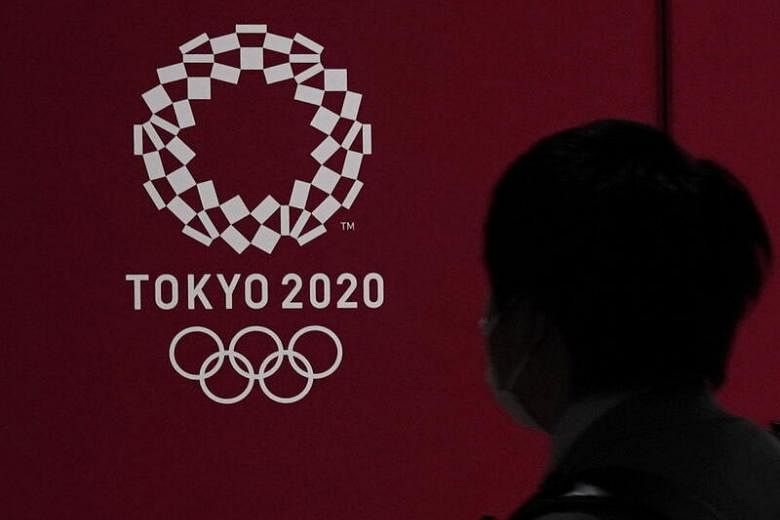TOKYO - Japanese Prime Minister Shinzo Abe, who has been adamant about holding the Tokyo Olympic Games as scheduled this summer, on Monday (March 23) buckled in the face of growing global opposition and said a postponement was on the table.
"I have to say that the world is not in a condition for an Olympics at this point in time," he told the Diet, as Japan's Parliament is known. But he stressed that scrapping the marquee sporting event altogether was not on the cards.
He had previously emphasised that the Games must be held in "a complete format", with spectators and not behind closed doors, adding yesterday: "When it becomes difficult to do so, we will have no choice but to postpone the Games and give top priority to the athletes."
This was his first time acknowledging that it may be foolhardy to press on with the event as planned.
The Olympics are scheduled from July 24 to Aug 9, while the Paralympics are slated from Aug 25 to Sept 6.
The International Olympic Committee (IOC) and Japan's insistence that the show would go on had appeared increasingly tone deaf by the day amid the epidemic.
Australia and Canada, both friends of Japan, said they would withdraw from the Games were Japan to hold it this year.
Calls to delay the Games also came from sports organisations in countries such as Brazil, Britain, France and Norway.
Japanese media were in overdrive yesterday over when would be the best time for the delayed Olympics, with either 2021 or 2022 likely despite a packed sporting calendar.
Japan had, as late into the Covid-19 outbreak as this month, said it had no Plan B were the Games not to take place as scheduled.
But the IOC came under a maelstrom of criticism from athletes who are unable to train, with sporting facilities under lockdown in many countries, and as medical experts forecast the epidemic to last until year-end at the earliest.
And even if Japan, with 1,109 cases as of Monday night, managed to get the domestic outbreak under control, holding the Games would mean opening its doors to athletes and visitors worldwide, including potential carriers of the virus.
The IOC said on Sunday that it would look into alternative plans, with a decision to be made within the next four weeks, to "allow better visibility of the rapidly changing development of the health situation around the world and in Japan".
Tokyo Governor Yuriko Koike said on Monday that a lockdown of Tokyo, with 138 cases as of yesterday with an increasing number of unlinked infections in recent days, was possible if the situation were to worsen.
She was on the same page as Mr Abe and the IOC on the Games, adding: "The Tokyo Games now has another goal, which is to defeat the coronavirus."
Tokyo 2020 Olympic Committee chief Yoshiro Mori also said: "Japan is in a critical state, and the situations in the United States and Europe have been abnormal. We are not so foolish to insist on doing it the planned way."
He added that the 121-day Olympic torch relay is still set to flag off from Fukushima this Thursday.
The plan was still going ahead as of Monday night, though he said Mr Abe was reluctant to attend the kick-off ceremony given the government's advice for restraint.
A public display of the torch in Sendai in north-east Japan last Saturday had already drawn backlash after 52,000 people flocked to the event against expert advice on social distancing.
The Japanese public are also overwhelmingly in favour of postponing the Games, as evident in a series of media polls. The latest, a weekend survey by the Yomiuri daily, showed that seven in 10 people felt it was better to delay the event.
Still, any delay to the Games will bring a blow to the Japanese economy. Jiji Press cited Dai-ichi Life Research Institute chief economist Toshihiro Nagahama as estimating that the Japanese economy could lose 3.2 trillion yen (S$42.39 billion) this year.
Professor Heng Yee Kuang, at University of Tokyo's Graduate School of Public Policy, told The Straits Times that Mr Abe was "bowing to the inevitable and that the writing was on the wall".
"It has been clear for some time that the Olympics is not tenable when many athletes are not able to train or even qualify," he said, adding that continuing to insist on going ahead with the Games at this point might backfire on Mr Abe politically and diplomatically.
Sophia University political scientist Koichi Nakano added that Mr Abe could have put his foot down much earlier, instead of seemingly reacting to global pressure.
"Mr Abe has staked a lot on the Olympics but this has been jeopardised by the coronavirus, making it impossible to host the Games on schedule," he said.
"Maybe it was an eagerness not to lose face, but it says a lot about Japanese crisis management... It would have been more productive had he accepted it was a lost cause and refocused his priorities."












